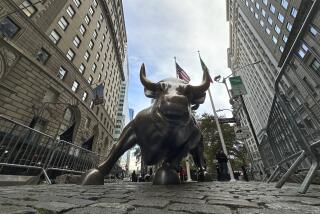Stocks Tumble Despite Solid Income Reports
Stocks slid again Monday, eroding hopes that last week’s turbulent sell-off and sharp turnaround represented a bottom in the market’s first significant pullback in more than five years.
The Dow Jones industrial average fell 35.88 points to 5,390.94, or 0.66%, recovering from two deficits of more than 50 points that twice triggered the New York Stock Exchange’s curbs on computer-driven trading. Other major indexes fell even further on a percentage basis. For example, the Standard & Poor’s 500 index fell 0.78%.
Companies ranging from drug maker Warner-Lambert to oil producer Mobil beat profit estimates for the latest quarter only to see their shares fall. The slump stems partly from growing doubt that companies will be able to match or exceed analysts’ earnings forecasts for the rest of the year.
“The stock market is a forward-looking mechanism, so by the time you get to July, investors are looking out at 1997,” said Rao Chalasani, chief investment strategist at Everen Securities Inc. “Economic growth will be slower next year, so profit growth is going to further slow next year too.”
The worst losses again appeared in the computer-related sector, with the technology-heavy Nasdaq market giving back another chunk of Wednesday’s and Thursday’s strong rebound from a harrowing slide earlier last week.
Notably, an impending earnings report by software giant Microsoft hung over the battered technology sector and the rest of the market throughout an otherwise quiet session. After the close of trading, Microsoft reported a 52% increase in profit for its latest quarter. The result was within range of analyst forecasts, making it unclear how investors might react today.
In advance of its earnings report, Microsoft shares fell 1 15/64 to 119 3/4.
Analysts said Wall Street fretted that Federal Reserve Board Chairman Alan Greenspan, who indicated Thursday that he would not raise interest rates soon, may change his testimony today to Congress if he believes that the market misinterpreted his views.
“I’m not expecting anything different. But now Wall Street anticipates the worst when it used to anticipate the best,” said Robert Stovall, president of Stovall/21st Advisors.
In the bond market, the closely watched 30-year Treasury bond yield rose to 7.01% from 6.98% at Friday’s close.
Declining issues outnumbered advancers by an 11-4 margin on the NYSE, where volume totaled just 327.25 million shares, down considerably from the hectic pace that made last week the busiest in history.
“We’ve had major technical damage, and it’s going to take time for the market to get out of this technical rut. So for the short-term, the market should stay on the defensive,” said Peter Cardillo, director of research at Westfalia Investments. “But I’m still looking for a summer rally to take us into record territory.”
The negative tone set by last week’s indications of rising mutual fund withdrawals also continued to dampen investor conviction.
“Everyone knew the money flows couldn’t be sustainable, but the real test will be whether they’re going to be positive enough to provide some more fuel for stock prices or if we’re going to go back to the days where everybody cuts and runs at the first sign of trouble,” said John Cleland, chief investment strategist at Security Benefit Group in Topeka, Kan.
Among market highlights:
* The Dow’s decline was led by AT&T;, down 1 3/4 to 51 5/8, which continued to struggle under perceived signs of weakness in last week’s earnings report; Sears, down 1 5/8 to 42 1/2; and IBM, down 1 1/4 to 92 1/2.
* Airline stocks continued weaker after last week’s TWA plane crash off Long Island, N.Y. TWA slipped 1/4 to 9 1/4. AMR, the parent company of American Airlines, lost 1 1/4 to 77 1/2, Delta was off 2 3/8 to 70 1/4 and UAL, United Airline’s parent, fell 1 to 45 1/4. InVision, the maker of the only Federal Aviation Administration-certified bomb-detection device, rose 3 to 21.
* Portland General climbed 7 to 35 1/8 and Enron fell 2 to 39 3/4 after the two companies agreed to merge in a planned $2.1 billion tax-free stock transaction.
* Newbridge Network slumped 6 1/2 to 42 7/8 after UBS Securities lowered its rating on the stock.
* Cisco Systems fell 1 1/8 to 50 5/8 and Telebit added 1 15/16 to 12 13/16 after Cisco agreed to buy Telebit and its Modem ISDN Channel Aggregation technology for $13.35 a share.
* Washington Mutual rose 4 7/8 to 35 after it said it would buy Keystone Holdings in a stock swap that would create a banking company with more than $42 billion in assets.
Overseas markets were ruffled by Friday’s retreat on Wall Street. Tokyo’s Nikkei stock average fell 2.2%, Frankfurt’s DAX index fell 1.5% and London’s FTSE 100 fell 0.8%.
Market Roundup, D8
More to Read
Inside the business of entertainment
The Wide Shot brings you news, analysis and insights on everything from streaming wars to production — and what it all means for the future.
You may occasionally receive promotional content from the Los Angeles Times.










